
It comes as no surprise that Congressional Republicans are balking at President Obama's $447 billion program forecast to produce as many as 1.9 million jobs. But while the GOP has opposed Obama's calls for new tax revenue from the wealthiest Americans to pay for it, most of the Republican presidential field wants to give them yet another trillion dollar tax cut payday by eliminating the capital gains tax.
With U.S. income inequality at its highest level in 80 years and the total federal tax burden at its lowest in 60, the last thing America needs to do is further reduce the capital gains tax. As a decade of data shows, the Treasury-draining Bush capital gains and dividend tax windfall for the wealthy not only failed to produce employment gains from America's so-called "job creators." As the Washington Post detailed, "capital gains tax rates benefiting wealthy feed [the] growing gap between rich and poor." Nevertheless, most Republicans are calling for a new capital gains tax rate: zero.
As the Post explained, for the very richest Americans the successive capital gains tax cuts from Presidents Clinton (to 20 percent) and Bush (to 15 percent) have been "better than any Christmas gift":
While it's true that many middle-class Americans own stocks or bonds, they tend to stash them in tax-sheltered retirement accounts, where the capital gains rate does not apply. By contrast, the richest Americans reap huge benefits. Over the past 20 years, more than 80 percent of the capital gains income realized in the United States has gone to 5 percent of the people; about half of all the capital gains have gone to the wealthiest 0.1 percent.
The convenient chart above tells the tale. And as the Washington Post suggests elsewhere in its jaw-dropping series "Breaking Away," plummeting tax rates overall and on capital gains in particular have been widening the chasm between the rich and everyone else in America:
Nevertheless, the same Republicans digging in their heels against President Obama's latest proposed middle tax relief in the form of a continued payroll tax holiday want to gut the capital gains tax or eliminate it altogether.
In 2008, Republican presidential nominee John McCain called for halving the rate to 7.5 percent, a move which would have earned him and his beer heiress wife tens of thousands of dollars annually. This year's crop of GOP White House hopefuls is little different. While Newt Gingrich long ago echoed Alan Greenspan's demand that "the appropriate capital gains tax rate was zero," Jon Huntsman reversed course to take the same position. (For his part, Mitt Romney wants to end capital gains taxes for that small group earning under $200,000 a year.) And as ThinkProgress reported, they have a lot of company from Michele Bachmann, Herman Cain and Ron Paul among Republican presidential candidates looking to drain $1 trillion from the Treasury over the next decade.
Of course, given the massive giveaway of the past 10 years, yet another capital gains bonanza for the gilded-class will only serve to empty Uncle Sam's coffers while doing little to benefit the economy overall.
Back in May, John Boehner explained to CBS News who Republicans would be trying to protect during the debt ceiling negotiations with President Obama:
"The top one percent of wage earners in the United States...pay forty percent of the income taxes...The people he's talking about taxing are the very people that we expect to reinvest in our economy."
If so, those expectations were sadly unmet after the tax cuts of George W. Bush. After all, the last time the top tax rate was 39.6 percent during the Clinton administration, the United States enjoyed rising incomes, 23 million new jobs and budget surpluses. Under Bush? Not so much.
On January 9, 2009, the Republican-friendly Wall Street Journal summed it up with an article titled simply, "Bush on Jobs: the Worst Track Record on Record." (The Journal's interactive table quantifies his staggering failure relative to every post-World War II president.) The meager one million jobs created under President Bushdidn't merely pale in comparison to the 23 million produced during Bill Clinton's tenure. In September 2009, theCongressional Joint Economic Committee charted Bush's job creation disaster, the worst since Hoover:
As David Leonhardt of the New York Times aptly concluded last year:
Those tax cuts passed in 2001 amid big promises about what they would do for the economy. What followed? The decade with the slowest average annual growth since World War II. Amazingly, that statement is true even if you forget about the Great Recession and simply look at 2001-7.
The data are clear: lower taxes for America's so called job-creators don't mean either faster economic growth ormore jobs for Americans.
But while Boehner's job creators didn't create any jobs after the top rate was trimmed to 35 percent and capital gains and dividends taxes were slashed, they did enjoy an unprecedented windfall courtesy of the United States Treasury.
For Republicans, this predictable result of the Bush tax cuts was a feature, not a bug.
As the Center for American Progress noted in 2004, "for the majority of Americans, the tax cuts meant very little," adding, "By next year, for instance, 88 percent of all Americans will receive $100 or less from the Administration's latest tax cuts."
But that's just the beginning of the story. As the CAP also reported, the Bush tax cuts delivered a third of their total benefits to the wealthiest 1 percent of Americans. And to be sure, their payday was staggering. The Center on Budget and Policy Priorities showed that millionaires on average pocketed almost $129,000 from the Bush tax cuts of 2001 and 2003. As a result, millionaires saw their after-tax incomes rise by 6.2 percent, while the gain for those earning between $40,000 and $50,000 was paltry 2.2 percent.
And as the New York Times uncovered in 2006, the 2003 Bush dividend and capital gains tax cuts offered almost nothing to taxpayers earning below $100,000 a year. Instead, those windfalls reduced taxes "on incomes of more than $10 million by an average of about $500,000." As the Times explained in a shocking chart: "The top 2 percent of taxpayers, those making more than $200,000, received more than 70% of the increased tax savings from those cuts in investment income."
It's no wonder that between 2001 and 2007- a period during which poverty was rising and average household income had fallen - the 400 richest taxpayers saw their incomes double to an average of $345 million even as their effective tax rate was virtually halved. As the Washington Post noted, "The 400 richest taxpayers in 2008 counted 60 percent of their income in the form of capital gains and 8 percent from salary and wages. The rest of the country reported 5 percent in capital gains and 72 percent in salary."
As ThinkProgress demonstrated, historically lower tax rates for the richest Americans did not produce eithermore job creation or faster economic growth. (In fact, the Bush years produced what the Times' Leonhardt rightly labeled as "The decade with the slowest average annual growth since World War II.") But what the conservative cornucopia for the gilded-class does reliably produce is unprecedented income inequality.
(It's worth noting that the changing landscape of loopholes, deductions and credits, especially after the 1986 tax reform signed by President Reagan, makes apples-to-apples comparisons of effective tax rates over time very difficult. For more background, see the CBO data on effective tax rates by income quintile.)
At the end of the day, cutting capital gains taxes like the estate tax ultimately produces just another payout for many who have already won life's lottery. As Warren Buffett once suggested, it's time for Washington to stop "giving incredible head starts to certain people who were very selective about the womb from which they emerged."
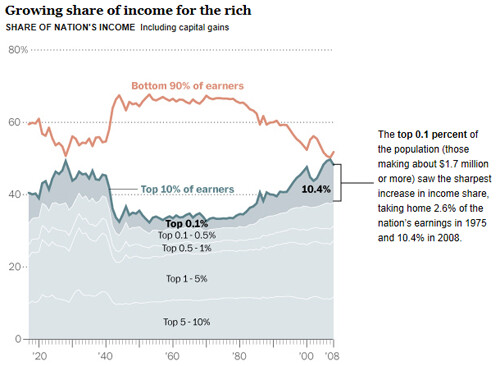
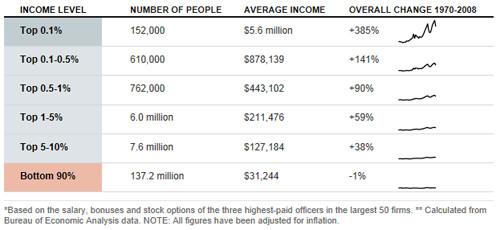

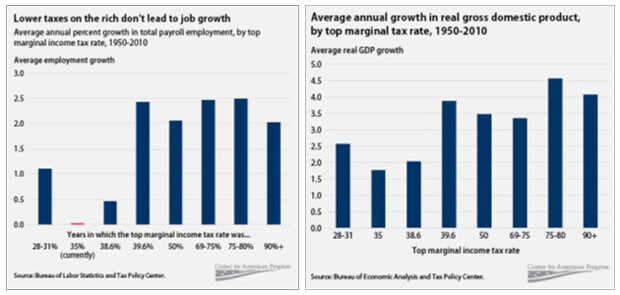
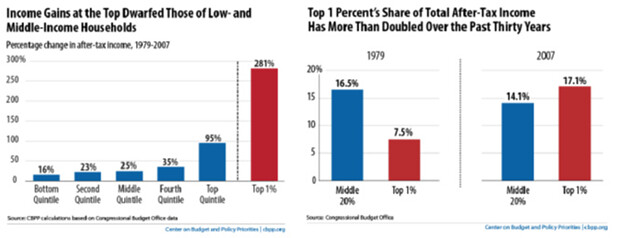
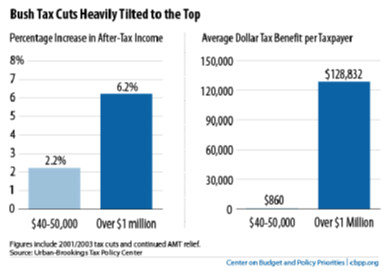
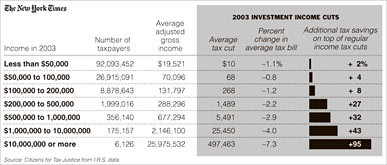
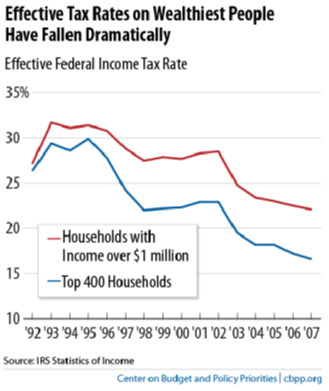

No comments:
Post a Comment